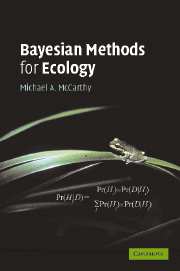Book contents
- Frontmatter
- Contents
- Preface
- 1 Introduction
- 2 Critiques of statistical methods
- 3 Analysing averages and frequencies
- 4 How good are the models?
- 5 Regression and correlation
- 6 Analysis of variance
- CASE STUDIES
- 7 Mark-recapture analysis
- 8 Effects of marking frogs
- 9 Population dynamics
- 10 Subjective priors
- 11 Conclusion
- APPENDICES
- References
- Index
9 - Population dynamics
Published online by Cambridge University Press: 05 June 2012
- Frontmatter
- Contents
- Preface
- 1 Introduction
- 2 Critiques of statistical methods
- 3 Analysing averages and frequencies
- 4 How good are the models?
- 5 Regression and correlation
- 6 Analysis of variance
- CASE STUDIES
- 7 Mark-recapture analysis
- 8 Effects of marking frogs
- 9 Population dynamics
- 10 Subjective priors
- 11 Conclusion
- APPENDICES
- References
- Index
Summary
WinBUGS is essentially a programming language that is particularly useful for generating a range of probability distributions. As such, it can be used to simulate a range of stochastic models. In ecology, some of the most common forms of stochastic models are those for predicting the viability of species (Shaffer, 1981; Gilpin and Soulé, 1986; Burgman et al., 1993).
There are several advantages of using WinBUGS to simulate population dynamics. One is the broad range of probability distributions that is available. Another is that it is relatively easy to extend the simulation to consider how uncertainty in the parameter estimates for the model influences uncertainty in its predictions. This use of WinBUGS is illustrated here with a model of the dynamics of mountain pygmy possums.
Mountain pygmy possums
Mountain pygmy possums are small (adult body weight of 40–45 g) terrestrial possums inhabiting alpine regions of southeastern Australia. The species occurs in the Snowy Mountains in New South Wales, the Hotham/Bogong region in Victoria, and in the vicinity of Mt Buller in Victoria. Populations in these regions are variously fragmented. Typical breeding areas are boulder fields above the snowline (approximately 1500 m above sea level). The species is omnivorous, eating a range of invertebrates (Bogong moths in particular) and plant matter (Mansergh et al., 1990; Smith and Broome, 1992). Breeding occurs in spring, with a single litter of four offspring being produced. Males migrate from the breeding areas by the end of summer, and typically over-winter in areas up to several kilometres away.
Information
- Type
- Chapter
- Information
- Bayesian Methods for Ecology , pp. 217 - 224Publisher: Cambridge University PressPrint publication year: 2007
